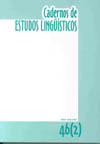Resumo
This paper presents a descriptive analysis of intransitive verb behavior in Brazilian Portuguese, specially the verbs known as unaccusative ones. We propose a prototypical analysis of this verb class, because the tests proposed by the literature do not always reach to define exactly what are the typical properties of unaccusativity or not. As observed from the BP data, there are some typical unaccusative verbs, some typical inergative verbs, but there are also other verbs, which present properties from both classes. Thus, we show here 40 verbs from BP and their behavior in relation to unaccusativity.Referências
ALEXIADOU, A.; E. ANAGNOSTOPOULOU & M. EVERAERT (orgs.) (2004) The Unaccusativity Puzzle. Explorations of the syntax-lexicon interface. New York, Oxford University Press.
BELLETTI, A. e RIZZI, L. (1988) Psych verbs and Theta-theory. Natural Language and Linguistic Theory, 6: 291-352.
BURZIO, L. (1986) Italian Syntax: a government and binding approach. Dordrecht: D. Reisel Publishing Company.
CANÇADO, M. (1997). Os Psico-Verbos do Português Brasileiro e a Hipótese Inacusativa de B&R: Indícios para uma Proposta Semântica. DELTA 13.1: 119-139.
CANÇADO, M. (2003). Um estatuto teórico para os papéis temáticos. In: A. L. MÜLLER, E. V. NEGRÃO & M. J. FOLTRAN (orgs.). Semântica formal. São Paulo: Contexto, p. 95-124.
CANÇADO, M. (2005a). Manual de Semântica: noções básicas e exercícios. Belo Horizonte: Editora UFMG.
CANÇADO, M. (2005b). Posições Argumentais e Propriedades Semânticas. DELTA. V. 21.1.
CANÇADO, M. & C. FRANCHI (1999). Exceptional Binding with Psych-Verbs? Linguistic Inquiry, 30.1:133-143.
CHAFE, W. L. (1970). Meaning and the Structure of Language. Chicago: Chicago University Press.
COELHO, I. (2000) A ordem V-DP em construções monoargumentais: uma restrição sintático-semântica. Tese de doutorado. Universidade Federal de Santa Catarina.
DOWTY, D. (1979) Word Meaning and Montague Grammar. Dordrecht: Kluwer Academic Publishers.
DOWTY, D. (1989) On the Semantic Content of the Notion of Thematic Role. IN: Chierquia, Partee e Turner. Eds. Properties, Types and Meaning. Studies in Linguistic and Philosophy, 2: Semantic Issues. Daordrecht: Kluver, p. 69-124.
ELISEU, M. (1984). Verbos Ergativos. Dissertação de Mestrado, Universidade de Lisboa.
FIGUEIREDO E SILVA, M. C. (1996) A posição do sujeito no português brasileiro: frases finitas e infinitivas. Campinas: Editora da Unicamp.
FILLMORE, C. (1968). The Case for Case. In E. Bach e R. Harms (eds). Universals in Linguistic Theory. New York: Holt, Rinnehart and Winston.
FILLMORE, C. (1971). Some Problems for Case Grammar. Monograph Series on Language and Linguistics 24.
FOLTRAN, M.J. & G. CRISÓSTIMO (no prelo). Os Adjetivos Participiais no Português. Revista de Estudos da Linguagem. Faculdade de Letras. UFMG.
FRANCHI, C. (1997) Predicação. Manuscrito publicado em CANÇADO, M. Org. (2003). Predicação, Relações Semânticas e Papéis Temáticos: Anotações de Carlos Franchi. Revista de Estudos da Linguagem. Vol. 11 - No. 2.
GRIMSHAW, J. (1987) Unaccusatives - An Overview. IN: proceedings of NELS 17,244-59. GLSA, University of Massachusetts.
HOUT, A. V. (2004) Unaccusativity as Telicity Checking. IN: A. ALEXIADOU, E. ANAGNOSTOPOULOU & M. EVERAERT (orgs.) The Unaccusativity Puzzle. Explorations of the syntax-lexicon interface. New York: Oxford University Press.
ILARI, R. & R. BASSO (2004) Telicidade e Degree Achievements. Anais do VI Encontro do Círculo de Estudos Lingüísticos do Sul. Florianópolis: CELSUL.
JACKENDOFF, R. (1972) Semantic interpretation in generative grammar. Cambridge (MA): MIT Press.
JACKENDOFF, R. (1983) Semantics and Cognition. Cambridge (MA): MIT Press.
JACKENDOFF, R. (1990) Semantic Structures. Cambridge (MA): MIT Press.
KATO, Mary A. (2000) A restrição de Mono-Argumentalidade da Ordem VS no Português do Brasil. Fórum Lingüístico, n. 2: 97-127.
LEVIN, B. (1983). On The Nature of Ergativity. Doctoral Dissertation, MIT.
LEVIN, B. & M. H. RAPPAPORT (1995) Unaccusativity. At the syntax-lexical semantics interface. Linguistic Inquiry, Monograph 26.
MARANTZ, A. P. (1984) On the Nature of Grammatical Relations. Cambridge (MA): MIT Press.
PILATI, Eloisa (2002) Sobre a ordem verbo sujeito no português do Brasil. Dissertação de mestrado. Universidade de Brasília.
PERLMUTTER, D. (1978) Impersonal passives and the Unaccusative Hypothesis. Berkeley Linguistics Society 4, p.157-189.
PERLMUTTER, D. (1980) Relational Grammar. In: MORAVCSIK & WIRTH (orgs.) Current Approaches to Syntax. New York: Academic Press.
ROSEN, C.G. (1984) The Interface between Semantic Roles and Initial Grammatical Relations. IN: PERMULTTER & ROSEN (eds). Studies In Relational Grammar 2. Chicago: University of Chicago Press.
VENDLER, Z. (1967) Linguistics in Philosophy. New York: Cornell University Press.
VERKUYL, H. J. (1989) Aspectual classes and Aspectual composition. Linguistics and Philosophy 12. Daordrecht: Kluver, p.39-94.
VIOTTI, E. C. (2002) Sobre o efeito de definitude nas sentenças existenciais. Revista do Gel – 50º Seminário em memória de Carlos Franchi. São Paulo: Contexto, p. 127-153.
O periódico Cadernos de Estudos Linguísticos utiliza a licença do Creative Commons (CC), preservando assim, a integridade dos artigos em ambiente de acesso aberto.

